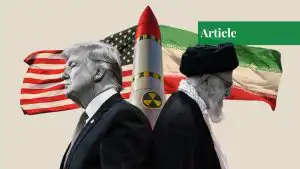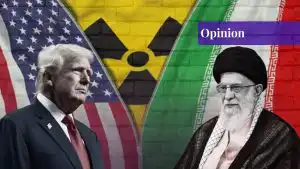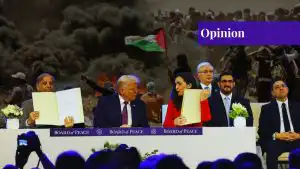Why did Iran attack Pakistan? The aforesaid question requires an elaborative response. The Iranian attack on Pakistan came at a time when the relations between the two countries were on a positive trajectory. More importantly, at the time of the attack, the Pakistan Navy was conducting joint naval exercises with Iran in the Strait of Hormuz. The session of the Pak-Iran Border Committee was underway at the Chahbahar Port of Iran and Iran’s security advisor for Afghanistan was on a sideline visit to Pakistan.
Under such high-profile engagements, the Iranian attack took both the state and the people of Pakistan by surprise. Pakistan has responded to Iran’s missile attack in the Sabz-Koh area of Balochistan, both by expelling the Iranian Ambassador to Pakistan and counter-striking the militant outfits inside Iran’s Sistan province. However, the damage inflicted upon the bilateral relations will take a lot of effort to be overhauled. It is, therefore, important to underline the possible reasons for the Iranian attack to prevent such type of escalation in the future.
Reasons
When examining Iran’s current foreign policy and strategic decisions, it becomes apparent that there are several potential factors that could have prompted Iran to conduct military operations within its southeastern neighbor.
Retaliation
First, these strikes could be deemed retaliatory in nature against the terrorist outfits that are complicit in carrying out the recent terrorist attacks like the Kerman bombings and the killing of 11 Iranian police officers in Rask. That is why, Iran not only claimed to attack Jaish-ul-Adl in Pakistan but also targeted ISIS hideouts in Syria. Hence, instead of targeting any state, Iran proactively undertook the military operation beyond its territorial boundaries by itself—the feat it normally does through the utilization of its proxy partners.
Despite having troubled relations with its neighbors and its involvement in counter-terrorism efforts in the Middle East at various levels, Iran, itself, is a stable country from a security perspective. However, since 2020, there has been a gradual surge in terrorist attacks inside the country, mostly along the border regions. Iran claimed that terrorists had come from across the borders and insisted the neighboring states including Pakistan rein down such groups. However, the persistent attacks provoked Iran to take up the retaliatory action by itself.
Reaffirming Deterrence
Second, the Iranian strikes are aimed at reaffirming its deterrence at the regional level. Since the start of the Gaza-Israel conflict, Iran has come under numerous attacks for which it accused Israel. Apart from cyberattacks on Iran’s petroleum stations in December 2023 and attacks on its military personnel in Syria which intensified since October 2023, Iran also blamed Israel for using terrorist outfits like ISKP (Islamic State Khorasan Province) and Jaish-ul-Adl as its proxies.
While linking Israel with the recent attacks, Iranian strikes on Syria and Pakistan along with the strikes in the Iraqi Kurdistan region over the alleged Mossad building, are attempts to signal that Iran would hit back at wherever makes it feel vulnerable. Furthermore, the precision with which the missiles had been targeted, reflected Iran’s capabilities of operating with robust missile technology. This could, therefore, be a manifestation of proclaiming itself as a missile power as well as signaling to the US and the West that Iran had developed an advanced arsenal as a response to the US withdrawal from JCPOA (Joint Comprehensive Plan of Action).
Pre-emptive strike third, after the Houthis’ attacks in the Red Sea and the involvement of the US naval fleet along with the proposal of establishing a joint naval coalition, Iran feared that Pakistan would soon be involved in the US-led naval coalition. Such fears stemmed from the fact that the US Ambassador to Pakistan, Donald Blome has been active recently as he visited Gwadar Port in September and visited the political leadership of the country.
Moreover, Pakistan’s Army Chief, General Syed Asim Munir, also visited the US in December where he held meetings with senior political and military officials. Therefore, there is a possibility that to curb the prospects of Pakistan joining the US-led coalition that would invariably affect Iran and its proxy partners in the Middle East, Iran conducted strikes inside Pakistan as a pre-emptive measure. However, this argument has some loopholes.
First, the relations between Iran and Pakistan are such that if there was a fear by the Iranians that Pakistan would collaborate with the US, this could be communicated through the proper established channels. Second, even if Pakistan had joined the US-led coalition (which was rebuffed by the Pakistan Navy), it would not have been an unusual scenario considering that such a coalition was not directly against Iran’s territorial integrity.
Outcomes
As the escalation has dialed down and both states have agreed to send their ambassadors to each other’s countries, the conflict, which was already limited, seems to be resolved. This development was followed by the visit of the Iranian Foreign Minister, Hossein Amir-Abdollahian, to Islamabad at the invitation of Pakistan’s Foreign Minister, Jalil Abbas Jilani. The Iranian FM had also called on Pakistan’s PM, Anwar ul Haq Kakar, and the Army Chief, General Syed Asim Munir.
A significant development occurred after the joint statements of both foreign ministers in which the involvement of “third party” states was duly acknowledged in sabotaging the relations between Pakistan and Iran. From Pakistan’s perspective, especially after the arrest of Kulbhushan Jadhav from Balochistan in 2016, the reference to a third-party state was India. However, from the Iranian standpoint, the US and Israel are exploiting the porous border region between Pakistan and Iran by sponsoring terrorist groups like Jaish ul Adl. This reflects Iran’s paranoia that it had been encircled from all sides including its eastern nuclear-armed neighbor.
Therefore, although the relations between the two states are now normalized, the impact of the border escalation would be long-lasting, especially on the bilateral relations as well as for regional stability for the reasons explained below:
Misbalancing
Firstly, Pakistan being a country that had delicately maintained a balance between Saudi Arabia and Iran, particularly following the Saudi-Iran rapprochement in March 2023, may find itself once more in a state of uncertainty regarding its relationship with Iran. This could lead to Pakistan’s chances of misbalancing between KSA and Iran. In fact, after an incident of such gravity, it is anticipated that Pakistan may seek closer ties with Saudi Arabia and the United States, potentially exacerbating tensions in its bilateral relationship with Iran in the process. Nonetheless, one variable can play a positive role in reaffirming Pak-Iran relations i.e., Iran Pakistan Gas Pipeline.
Since, Pakistan is an energy-deficient country, a need that compels it to import massive amounts of energy burdening Pakistan’s import bill and disrupting the balance of payments, the cheap energy source from Iran could help mitigate this crisis. In this regard, Pakistan has already approved the construction of the first phase of the gas pipeline. Nonetheless, if for any reason, the project execution is further delayed, given the precedence of Iran’s assertiveness against Pakistan through the border strikes, Pakistan could also face a liability through the International Court of Justice.
Spoilers
Secondly, as both states have claimed that strikes are conducted against the militant non-state actors residing in each other’s territory, there is a possibility that those militant outfits would carry out their attacks in both Iran and Pakistan which could create further instability in the border regions of both the states. In this regard, Pakistan has already suffered from an attack by the Balochistan Liberation Army (BLA) on Gwadar Port in March. This could further induce distaste in the bilateral relations between Pakistan and Iran as the former has repeatedly claimed that the hideouts of Baloch militants are based in the areas of Iran bordering Pakistan.
Conclusion
Though the state-to-state rift between Pakistan and Iran is seemingly resolved, the chances of regional instability and intensification of attacks by non-state actors have greatly enhanced with far-reaching impacts. Certain groups like TTP, ISKP, Jaish-ul-Adl, and others pose a serious threat that could poise the bilateral relations between the states.
It can already be observed in the case of Pak-Afghan relations where Pakistan has repeatedly accused the Taliban government in Afghanistan of not taking necessary actions against the TTP which is continuously carrying out attacks inside Pakistan. Therefore, the threat of non-state actors and their capability of sabotaging the bilateral state-to-state relations in South and West Asia cannot be overlooked. Furthermore, from this border escalation, it could be analyzed that the non-state actors are emboldened by the Afghanistan situation which provides them an easy route to retreat and find sanctuary given the instability of Afghanistan. Therefore, both Pakistan and Iran should consider devising cooperative measures to address the Afghan issue effectively.
Conclusively, both Pakistan and Iran should understand that involving in bilateral conflicts would be counterproductive for both states, especially when both these countries are facing militant activities in the border areas. Particularly essential for Iran is the realization that violating the sovereignty of its eastern neighbor with which it shares strong cultural, historical, political, religious, and social ties, could result in its further isolation in the region and could embolden its adversaries like Israel.
Notes and References
- Adnan Aamir, “Pakistan and Iran patch up ties but militants poised to play spoilers,” Nikkei Asia, 30 January 2024, https://asia.nikkei.com/Politics/International-relations/ Pakistan-and-Iran-patch-up-ties-but-militants-poised-to-play-spoilers.
- Abid Hussain,” Pakistan’s Gwadar port attacked, eight armed fighters killed,” Al-Jazeera, 20 March 2024.
- Anna Gordon, “What to Know About the Hacker Group That Shut Down 70% of Iran’s Gas Stations,” Time, 18 December 2023, https://time.com/6548680/iran-hacker-gas-stationcyberattack-israel/.
- Frances Mao, Caroline Davies, and Paul Adams, “Pakistan launches retaliatory strikes into Iran, killing nine people,” BBC, 18 January 2024, https://www.bbc.com/news/world-asia-68014882.
- “Iran blames Israel for police station attack that left 11 dead,” EFE, 17 December 2023.
- “Iran launches missile strikes in Iraq and Syria citing security threats,” Al Jazeera, 15 January 2024.
- Islamuddin Sajid, “Pakistan’s military chief meets US defense secretary in Washington,” Anadolu Agency, 12 December 2023, https://www.aa.com.tr/en/asia-pacific/pakistans-military-chiefmeets-us-defense-secretary-in-washington/3081953.
- Mariyam Suleman Anees, “Why Was the US Ambassador’s Visit to Gwadar Important?”
- Nathan Rennolds, “Iran struck Pakistan with missiles and drones as the 2 countries held a joint naval exercise,” Business Insider, 17 January 2024, https://www.businessinsider. com/iran-struck-pakistan-as-they-held-joint-military-exercise-2024-1.
- “Pakistan approves first phase of Iran-Pakistan gas pipeline,” Offshore Technology, 26 February 2024, https://www.offshore-technology.com/news/pakistan-iran-pipeline/? cf-view.
This piece was originally published by the Institute of Regional Studies Islamabad
If you want to submit your articles and/or research papers, please check the Submissions page.
The views and opinions expressed in this article/paper are the author’s own and do not necessarily reflect the editorial position of Paradigm Shift.
He is a Ph.D. scholar at SPIR, QAU. Currently, he is in charge of the Iran Program at the Institute of Regional Studies, Islamabad.
He has published over 3 dozen research papers, essays, and analytical pieces in renowned national and international journals, magazines, and news websites. He has also been interviewed by BBC, VOA, PTV, and other news channels. Mr. Naqvi regularly delivers guest lectures, and seminar talks and presents conference papers, both nationally and internationally, including in Iran and Russia.






